
Donate to Innerviews
Since 1994, Innerviews has provided uncompromising, in-depth interviews with musicians across every genre imaginable. And it does that with no trackers, cookies, clickbait, or advertising.
Your donations are welcome to help continue its mission of highlighting incredible music and artists, without any commercial considerations.
Your contributions will be instantly transformed into stories and videos, and cover hosting and web management costs. Importantly, your dollars will help ensure Innerviews remains absolutely free to all visitors, independent of their ability to financially support it.
Please consider making a donation today by using the PayPal QR code below.

Adam Holzman
Dynamic Refractions
by Anil Prasad
Copyright © 2025 Anil Prasad.
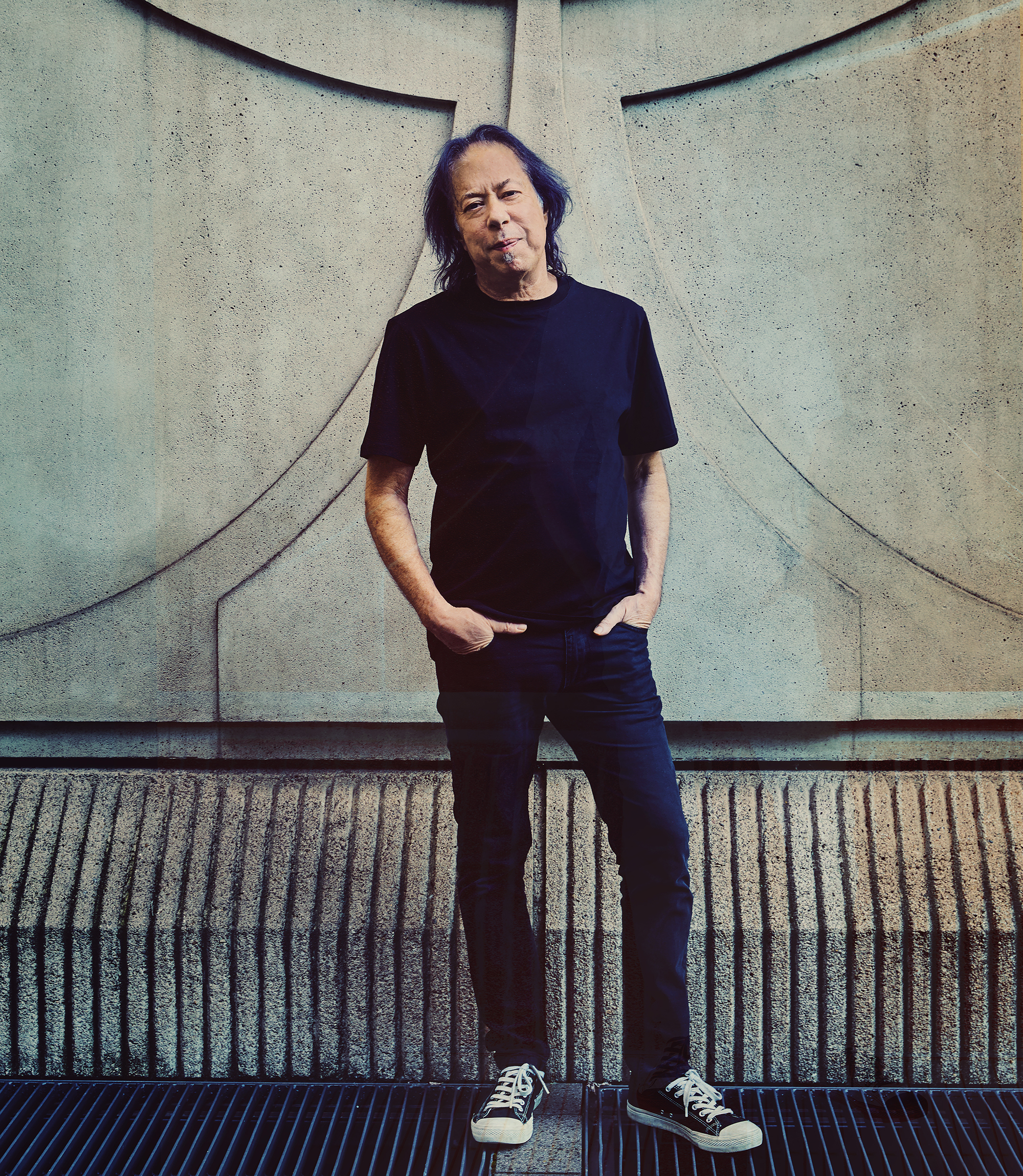 Photo: Hajo MüllerAdam Holzman continues to seamlessly shift across worlds through his expansive output. The keyboardist and composer expertly bridges the realms of jazz, rock, prog, and pop; deep grooves, ambient realms, and abstract experimentation; and analog and digital instrumentation.
Photo: Hajo MüllerAdam Holzman continues to seamlessly shift across worlds through his expansive output. The keyboardist and composer expertly bridges the realms of jazz, rock, prog, and pop; deep grooves, ambient realms, and abstract experimentation; and analog and digital instrumentation.
It’s a diverse worldview that’s evolved over a career working with some of the most important musicians in history, including Miles Davis, Grover Washington Jr., Wayne Shorter, Chaka Khan, Marcus Miller, and Michel Petrucciani. Holzman established himself as a first-call collaborator for them because of his flexibility, innovative and open-minded mindset, and willingness to do the hard work to realize projects and performances at their fullest potential.
Holzman is in his fifth decade as a musician, but he’s never been more prolific. His new solo album, Zombie Apocalypse, reflects and reimagines the keyboard colossus albums of the ‘70s and ‘80s from the likes of Vangelis, Edgar Froese, and Joe Zawinul. The vivid record is infused with synthesizers, space rock textures, and analog electronics. Contributions from saxophonist Ofer Assaf, percussionist Arjun Bruggeman, guitarist Jane Getter, and guitarist and vocalist Randy McStine, provide additional layers of invention and intrigue to its pieces.
Another recent Holzman release, My High School Band, looks back at his earliest days as a musician in a unique and engaging way. As the title implies, it finds him revisiting his first serious band from his teens. It features jazz-rock and prog tunes recorded in 1974 with guitarist Chris Ayres, bassist Doug Hodges, drummer Jim Summey, and vocalist and guitarist Chris Wooley. Notably, it also includes material from a recent reunion during which they recorded a clutch of new tunes that showcase the distance they’ve traveled collectively.
Incantation 1, a duo EP with his son, percussionist, producer, and arranger Russell Holzman, takes a more esoteric approach. It’s a live, improvised long-form piece focused on synthesizers, electronics, and soundscapes. Both father and son were ecstatic about the well-received collaboration, meaning further volumes are forthcoming.
Holzman’s ongoing work with the band Trifecta represents another key vector of his creativity. The trio, featuring bassist and Chapman Stick player Nick Beggs, and drummer Craig Blundell, put out their second LP The New Normal in 2024. It's a combination of uncompromising instrumentals, songcraft, and the occasional spoken word element. Its lyrics range from the profound and prescient to the humorous and biting.
Since 2011, Holzman has also been a member of the Steven Wilson band. He provides keyboards on virtually all of Wilson’s solo albums and tours. His latest contributions can be heard on the 2025 album The Overview, which explores the “overview effect,” a reference to the dramatic psychological impact astronauts experience when they view the Earth from orbit. Holzman is currently touring with Wilson in support of the release.
Beyond music, Holzman expresses his views on the world through his output as a comic artist. He regularly publishes comic strips on social media that are hilarious, sarcastic, and thought-provoking in equal measure. They typically examine the absurdities of modern life and the experiences of a working musician. In 2023, he released his third anthology of those strips titled Burn-Out, with a fourth book in the works.
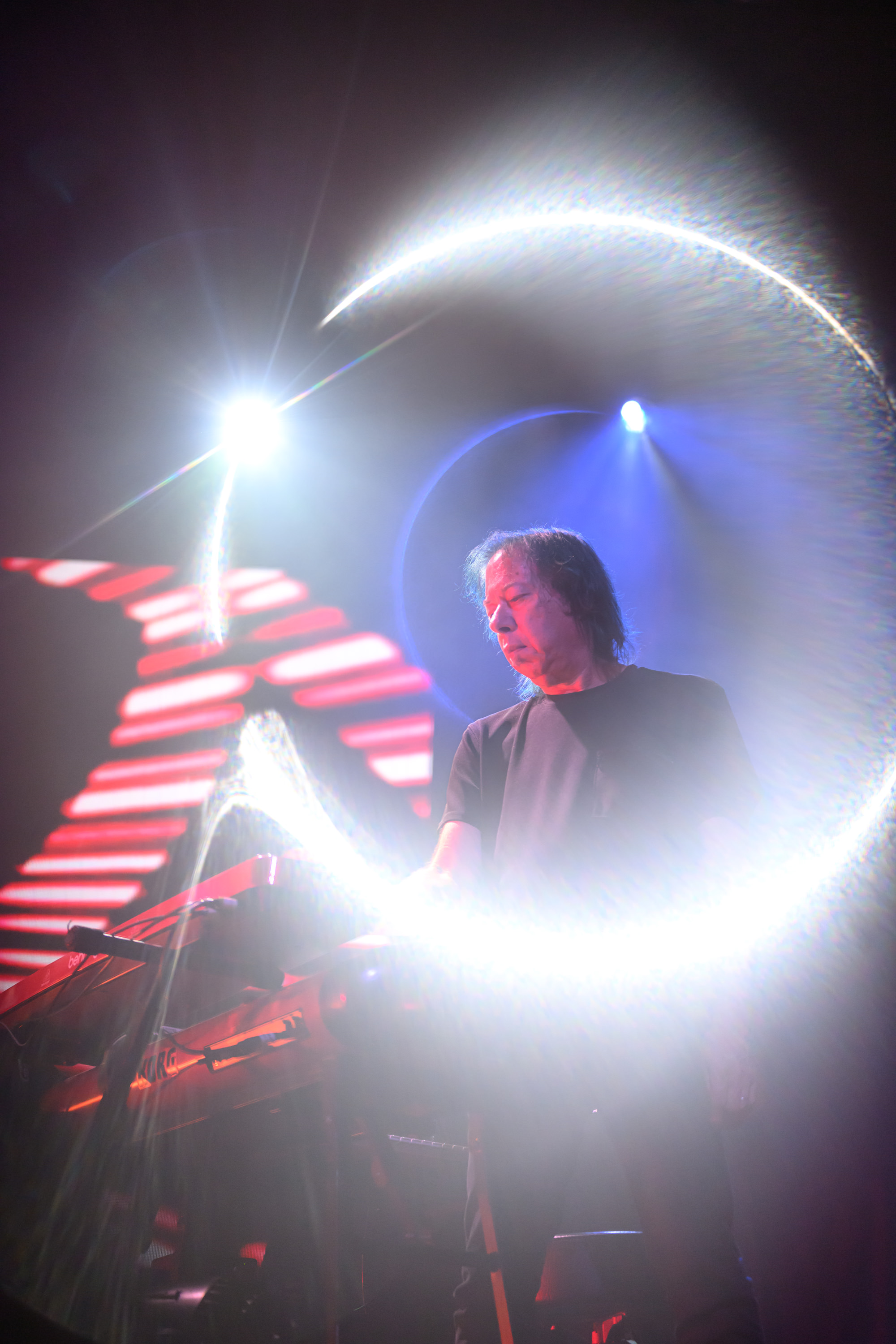 Photo: Joe del Tufo
Photo: Joe del Tufo
What does the value of music mean to you during this period of dramatic societal unrest?
I’ve been thinking about this recently. I think we’re all reaching for something and music is so much a part of my DNA that I have a hard time discussing it in an isolated context. I’m not the type of person that talks about the beautiful meaning of things. I tend to be more down to earth. But I’m still devoted to the cause of creative music. Almost all of the music I’ve played in professional gig situations or on my own has been creative music that I’m proud of. I’ve never had to play any drudgery gigs. I’ve been super-fortunate.
The question of what function music serves in this day and age is an interesting one. Is it entertainment? Is it for progressing, politically? Is it escapism? Progressive rock is notoriously apolitical. It has never been about fighting for causes. So, I guess it falls into more of the entertainment and escapist categories. And that's the function it serves.
When you go to a good concert, it’s great because it enables you to shut out the whole world. You can stop tripping on what’s going on out there and get to a place where your head is in a zone that’s so much better.
For me, exploring music and pursuing a creative calling have helped me get through what we’ve been experiencing in the last eight months in America.
Unfortunately, we sleepwalked into this situation we’re in. Since the Democratic Party turned its back on Bernie Sanders in 2016, I think we were doomed. I was living in a bubble thinking there was still a chance for sanity with Kamala Harris and that she would do great, but clearly that was way off track.
At this point in my life I want to be happy. To do that, I try to focus on making music, my friends, and my family. So, I’ve become kind of an ostrich. I stick my head in the ground and concentrate on those things and occasionally come up and look at what’s going on. It’s a survival mechanism.
Zombie Apocalypse is a very different record for you. Explore the approach you took on it.
It’s a pandemic record. I worked on it at home over a long period of time during and after that period. The title is self-explanatory. It’s what we were living through.
Musically, the album is more experimental for me. I wanted to do something that’s more ambient and synth- and-keyboard-based, instead of something band-oriented, which is what most of my records are. I’m usually focused on slamming grooves and wailing solos. This one is dialed down in that regard.
I wanted to make a kind of throwback album, so it’s modeled after those keyboard wizard records from the ‘70s and ‘80s. It’s mainly about opening up the music and letting the melody drive the sound. I was on a Weather Report kick while making it. So, I was influenced by Joe Zawinul in a lot of ways.
Joe would do interesting things. For example, after finishing a track, he would sometimes open up another channel, get a cool sound on a synth, and start jamming along. So, even though the original track was done, it would serve as inspiration for coming up with other things. It sounds like a mundane idea, but actually, it’s a really interesting thing to do. It’s slightly Brian Eno-esque and makes you think outside the box.
The album features a version of “Here Comes the Flood” by Peter Gabriel. It has Randy McStine on vocals. He and I performed it during one of those virtual music festivals that happened early on in the pandemic. We got a great response to it. It’s a great song that still addresses what’s happening today. So, I reworked the track a little bit and that’s what closes the record.
At the time, I wanted to make a record like this before there wasn’t a chance to make records anymore. That's what pandemic felt like. Remember how everything changed when it hit? Suddenly, you couldn’t go out and buy a taco. I don’t like dwelling on it too much, but this kind of thing could happen again. And I’m no spring chicken anymore. I’m at the point now where if there are projects I want to do, I better get them done, because you never know how long you’re going to be floating around.
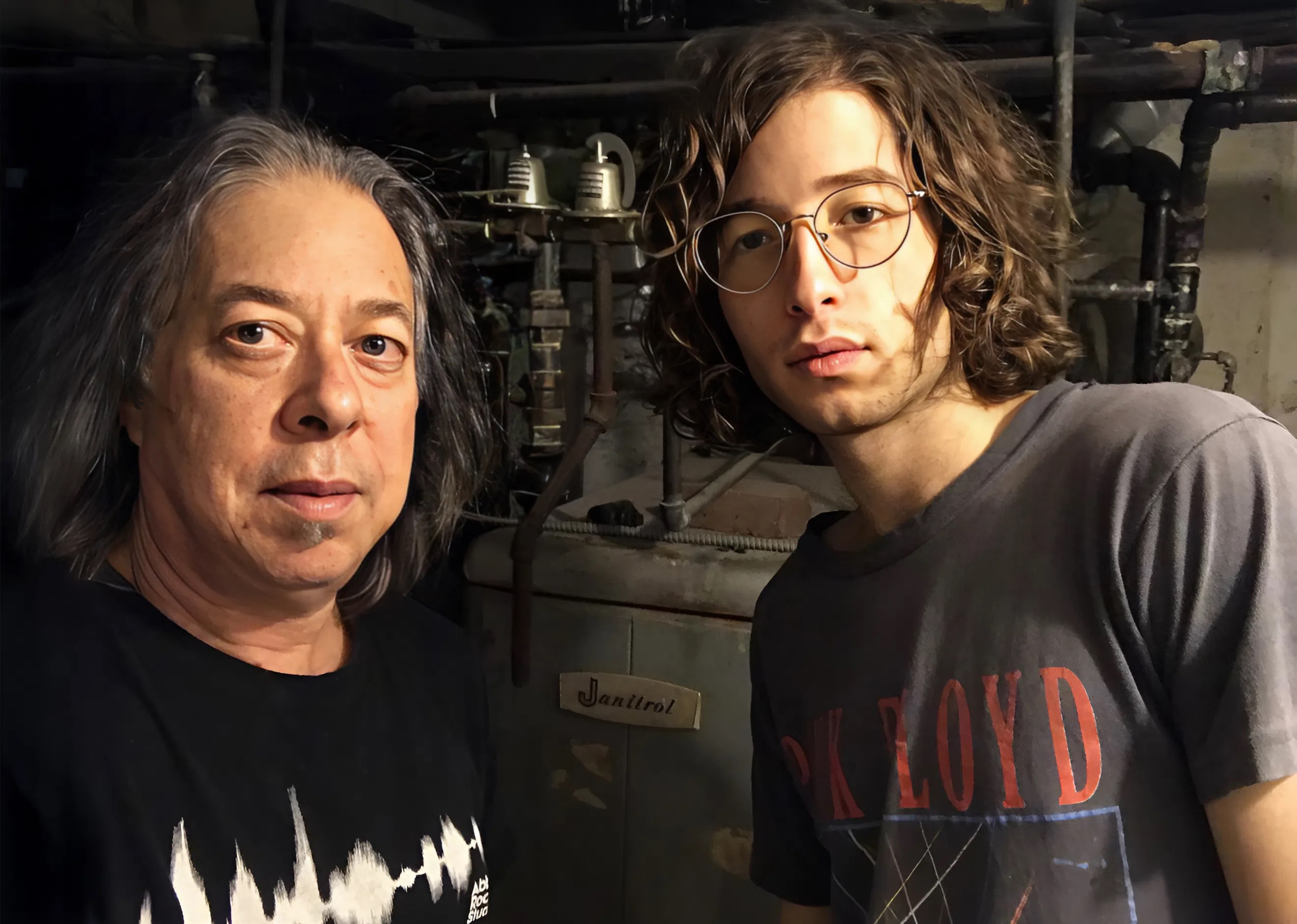 Adam Holzman and Russell Holzman | Photo: Adam Holzman Collection
Adam Holzman and Russell Holzman | Photo: Adam Holzman Collection
Incantation 1, your duo effort with your son Russell Holzman, has a very trippy, Berlin school electronica-inspired approach. How did you arrive at its direction?
Russell and I did a number of jams together during the pandemic. He was getting more and more into electronics and figuring out ways to trigger elements from my setup.
He played live over what I did. I don’t even really know how he does it, but he gets loops going that lock into what I’m doing, and we go from there. I’m kind of old school and I need to be pushed sometimes.
The jam that resulted in Incantation 1 was particularly inspired. There was something about the bass line that really worked. There’s also a point towards the end of the piece when I slow down the tempo about a third and it falls into another really cool groove. It was all unplanned. It’s 22 minutes long and I think it came out great.
We’ve got a bunch more stuff in the vault, so we’ll put out more in the future.
Russell has really hit the big time. He’s been touring with Caroline Polachek. I’m very proud of him.
The album My High School Band revisits your early history but also contextualizes it within the present. What made you want to look back at that period of your output in such a unique way?
I was very lucky. I had a great band back in high school. We had a really gifted rhythm section, with the bassist Doug Hodges and the drummer Jim Summey. The singer Chris Wooley and guitarist Chris Ayres were also very talented. The original name of the band was Five-Part Invention.
This all goes back to the pandemic, again. During that time, I reconnected with everyone, except Chris Ayres. Jim, Doug, and I recorded a song virtually, because we live in different parts of the country. And then Chris Wooley and I got together to do a version of “Soon” from Yes’ Relayer. Back in the day, we were enormous Yes fans. When we performed at high school parties, we’d play stuff like Close to the Edge, side four of Tales From Topographic Oceans, and other songs by Genesis and Jethro Tull.
In addition to those newer tracks. I found a recording that we did in my basement as a teenager. There was 20 minutes of material pretty well recorded on a Teac four-track. I transferred it to CD many years ago and used to play it in the car. I’d send copies to friends. As time went by, I realized that music from 50 years ago wasn’t just an old band tape, but a piece of my history. And I wanted to get it out there.
I listened to it on and off and figured some people might be interested. So, I did a limited run of CDs. It ties off a loose end of my career—the very beginning.
I should warn anyone reading this that there’s some raw, out-of-tune Minimoog on there. But this combination of things we worked on during the pandemic and the older recordings is something I’m proud of.
It’s funny. Back in high school, I always imagined what it would be like to be in an English progressive rock act. And then I actually became part of one with Steven Wilson. I felt like I was in The Beatles when I joined. I was the only American guy. Everyone else was British and it was kind of exotic to me. That idea was so distant and remote when I was in high school. It’s amazing how real life winds its way through various paths and you end up somewhere you could have only dreamed of as a kid.
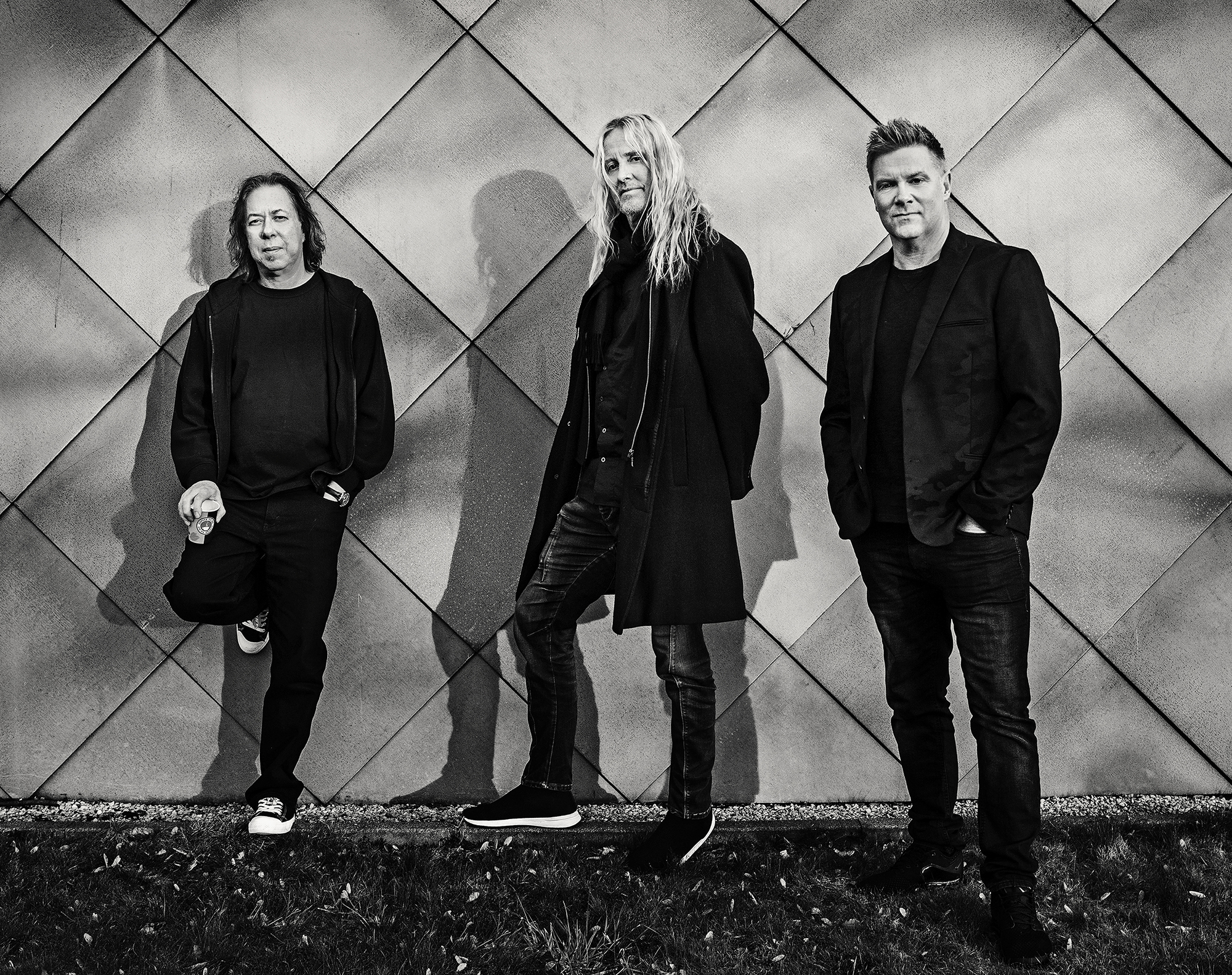 Trifecta: Adam Holzman, Nick Beggs, and Craig Blundell | Photo: Hajo Müller
Trifecta: Adam Holzman, Nick Beggs, and Craig Blundell | Photo: Hajo Müller
Last year, Trifecta released its second LP The New Normal. Describe the journey of the trio from its debut album to its very diverse follow-up.
The band began with Craig, Nick, and I jamming at soundchecks. Sometimes, I would pull out a phone and capture Craig’s drumbeats or one of Nick’s bass lines. We ended up having all these fragments of ideas recorded and decided to do something with them.
Once again, this goes back to the pandemic hitting. We had the time, so we assembled what we had come up with into a record and called it Fragments.
When it came time for the follow-up, we were still kind of stuck at home. We still weren’t touring that much. So, we put it together working remotely again, but the record is more written. It wasn’t based on jam ideas. We actually sat down to write songs.
The way it broke down is I came up with the jazz-rock and proggy instrumental stuff. Nick came forward with some wacky, freaky tunes, as well as some beautiful songs.
Craig also came up with some great ideas and compositions. The combination was sort of Zappa-esque and it seemed to work.
We named it The New Normal because it feels like everything has changed since the pandemic.
We’re going to do a third album starting early next year. We don’t know what it’s going to sound like, but I think we should make it completely different from the other two. That’s part of the fun of being in Trifecta.
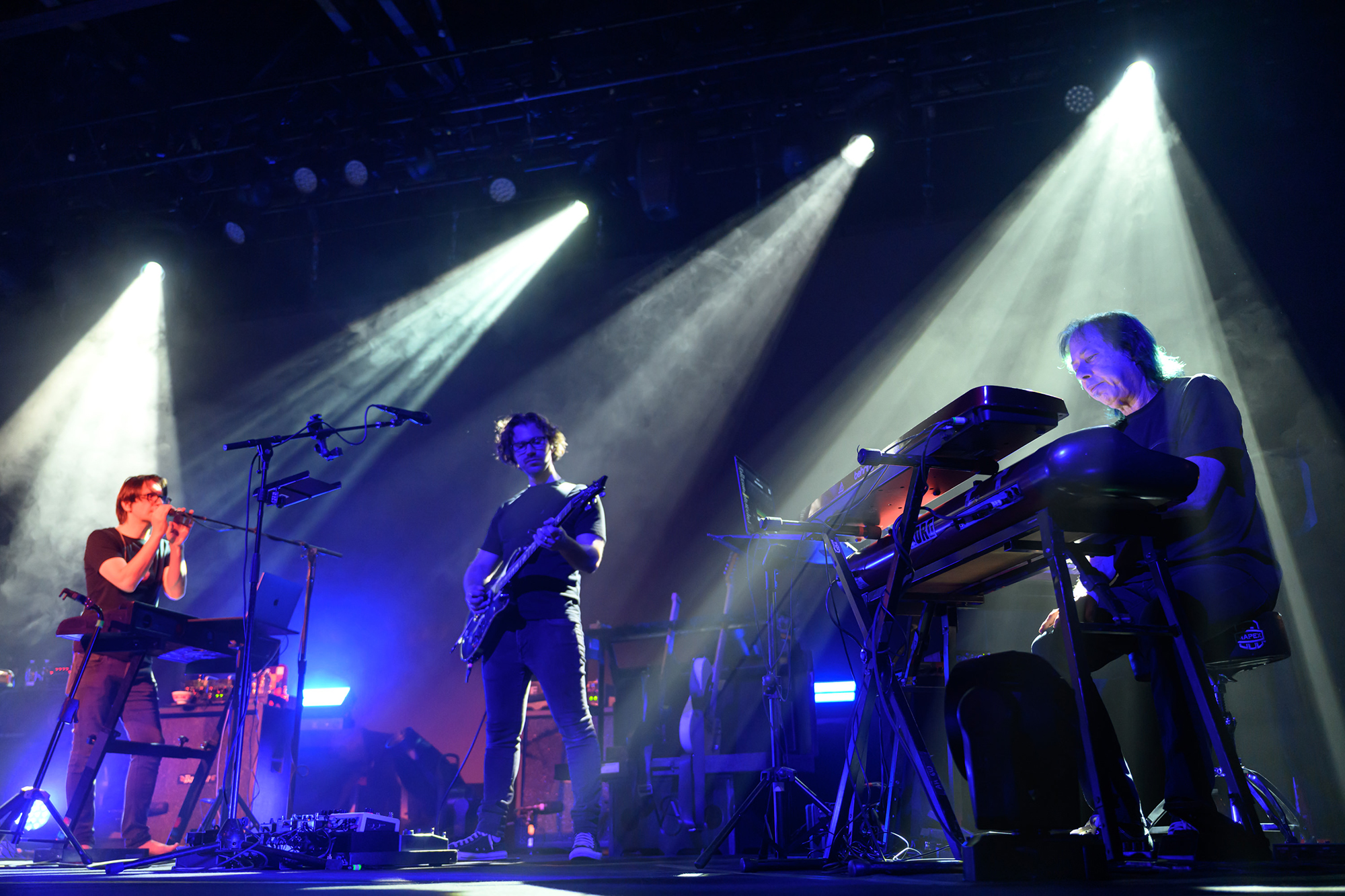 Steven Wilson, Randy McStine, and Adam Holzman perform at The Fillmore, Philadelphia, Pa., October 2025 | Photo: Joe del Tufo
Steven Wilson, Randy McStine, and Adam Holzman perform at The Fillmore, Philadelphia, Pa., October 2025 | Photo: Joe del Tufo
Explore your role on Steven Wilson’s latest album The Overview and its accompanying tour.
The way it worked is Steven would send me tracks and I’d find ways to fit some ideas into them. Some of what I give him he keeps, and some of it he doesn’t. But I was involved with the making of it over a long time. He also used my son Russell for one of the tracks, which was a very cool surprise.
I think the album reflects a really important idea involving astronomy and mathematics. It’s a very interesting presentation and Steven’s working at a very grand level in terms of the theme and the performance. I’m really impressed with his compositions.
When I started listening to what Steven was coming up with, I thought “Oh yeah. Sounds cool.” Then I started realizing how interrelated some of the chord structures, licks, and scales worked together, and how they would reemerge and be regrouped as the album continues.
Steven will take an idea and then treat it many different ways. That’s some proper composition happening there. Very impressive. The writing is really inspired. Some of the riffs on “Objects Outlive Us” are just killer.
In terms of the tour, Steven’s the maestro and he knows exactly what he wants. He makes it very clear during rehearsals what he’s expecting. So, I did my best to try and make that happen.
The Overview has long stretches with transition points that are very tricky to get right. If I fuck them up, I could fuck up the whole band. There are a few spots where it’s kind of perilous. I feel like I’m driving a motorcycle at the very edge of a cliff and trying not to make one wrong move. I also have to manage many keyboard sounds as well as switching pedals. It’s almost like a form of choreography.
So, intense concentration is required on this tour. I’ve written out almost all the parts to keep track of things.
I’m very proud to be a part of this album and tour. It’s a great project across the board.
Working with Steven is by far the longest-running collaboration of my career. I was with Miles Davis for four years and Grover Washington, Jr. for three. I’ve never done a gig like this where I’m in the band for years and years. It’s nice to get into a place where I feel I can be creative and still feel comfortable. I even collaborated with Steven on a song from The Harmony Codex titled “Economies of Scale.” I had an interesting electronic loop and some moody chords. I sent him the raw idea and he expanded it into the song, which also has a very cool video.
Steven is always changing up what he does, which is great. He’s never treading water. So, I have to keep reinventing what I’m doing to keep up with him. It’s great to have to keep adapting to work with such different music.

In 2023, you published your third comic anthology Burn-Out. Provide some insight into what informs these observational strips and how they help you cope with the absurdity of the world.
Humor has always been an important part of my life from the very beginning, since I started writing tunes. I always give tracks weird names. In real life, I’m always sarcastic and cracking jokes. Look at the world around us. I think it’s an important way of dealing with the insanity.
If something bugs me, I like to be able to somehow capture it and turn it into something. My comics are a hit with musicians. The idea is me complaining about stuff or being in disbelief about something I see or experience. It’s a nice way to get things off my chest.
I started doing these on the road. There’s always time to kill on tour, whether it’s waiting for soundcheck or being on the bus. So, that’s what enabled me to slowly build up a huge pile of comics.
I post the comics to Facebook as well and I think that place is perfect for them. I enjoy getting direct feedback from people. That’s not normally something you get when you publish stuff.
To date, I’ve done over 360 comics, and I have three books now, so I’ve taken a little break. I think the next one is going to be a proper graphic novel about a musician’s experiences.
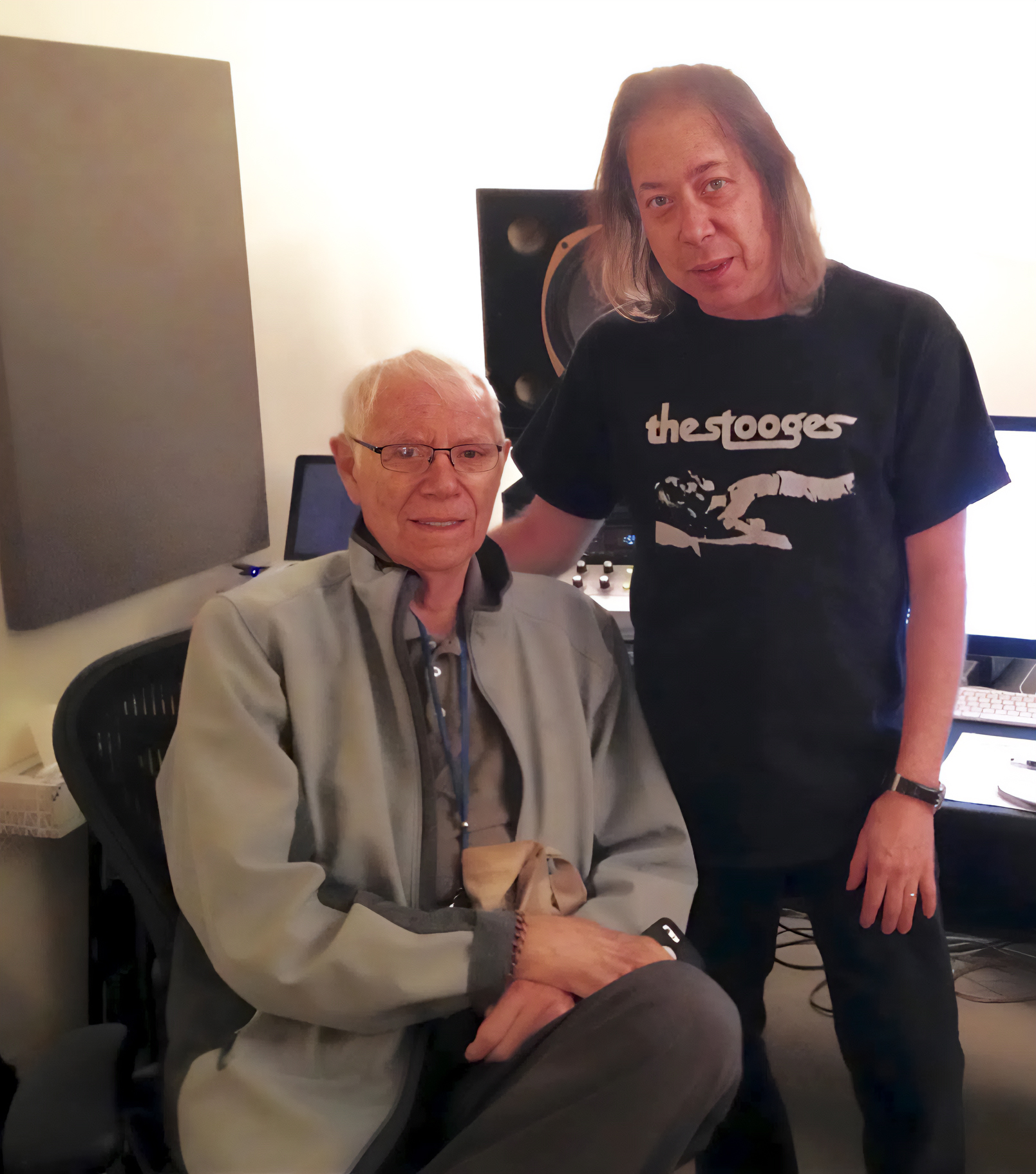 Jac Holzman and Adam Holzman | Photo: Adam Holzman Collection
Jac Holzman and Adam Holzman | Photo: Adam Holzman Collection
Your dad is music industry legend Jac Holzman. How is he doing these days and does he track your music and your career?
He’s still involved with Warner Brothers and still visits them at their office in Los Angeles. He’s like the resident Yoda. He knows where all the bodies are buried. [laughs] People on the Warner staff still ask him questions and he regales them with stories about the old days. He’s still active and involved, which is amazing because he’s 94.
He’s been to some Steven Wilson shows and has met him. It’s always very cool to see him in his old Jac Holzman role, talking to heavy artists like Steven.
He’s slowing down now. He had a birthday party last year that I was at. John Densmore was there, too, and we jammed a bit. That was a lot of fun.
I should mention that John, Arjun Bruggeman, Mark Egan, and I went into the studio after that and did a record that’s going to come out in 2026. It’s an ambient jazz kind of album and it’s very cool. It’s great to do a project like that, and it relates back to me meeting The Doors through my dad when I was a kid, which you and I have spoken about in previous interviews.
You grew up within the machinations of the music business and have experienced all the changes that have occurred first-hand since the ‘60s. What’s your view on the current state of the industry?
Today, it’s like science fiction. It’s totally Star Trek. I have no idea how the majority of musicians are making a living as it relates to recordings.
It bums me out that CDs were pushed aside. It drives me crazy that I can’t play a CD in my car. I even went to a fancy audio specialist that does car installations. He told me it would cost more than $1,000 to install a CD player in my 2019 Jeep. It’s a drag.
The transition to streaming is not something I’m onboard with, but I realize that’s where things are at, and I guess I better wake up and smell the coffee.
The record business has become much meaner over the years. It’s now so indifferent towards artists. I don’t think they care at all about the musicians. So, I don’t have a whole lot of hope for the business.
I don’t know what the future holds. I assume everything will be further scooped up by the big tech companies. I’m still trying to do things independently apart from the tech overlords and still sell my music directly to listeners.
How do you manage to stay focused as a creative entity despite those challenges?
I think my most recent comic book’s title Burn-Out spells it out. I’m starting to burn out, but I’m hanging in there. When Barack Obama got reelected, I had some hope for the world. Maybe I was deluded, but it felt like we were overall heading in a more positive direction.
The way things have changed now, I feel like some of the wind has been taken out of my sails. I have to make an effort to stay positive. But it isn’t easy.
Also, making a living today as a musician is more difficult than ever. I’m still dealing with trying to get gigs and making things happen. Even after doing this for so many decades, I still have to keep banging away at it.
One of my favorite keyboard players, the late T Lavitz from Dixie Dregs, once said to me, “There are three things that are important when it comes to doing a gig. First, are the people cool? Second, is the music good? And third, is the money good? If you can have two out of the three, you’re doing okay.”
For most musicians, usually the people and music are cool, but the money isn’t good. And other times, the money is good and that’s pretty much it. It’s a pretty accurate formula. You hope to have all three, but that’s rarer now than it’s ever been.
Today, it’s all about survival and how you connect with the rest of the world, so people know what you’re doing. But I know I’m very fortunate that I have the opportunity to play music for a living. That’s a privilege and one I remain very thankful for.